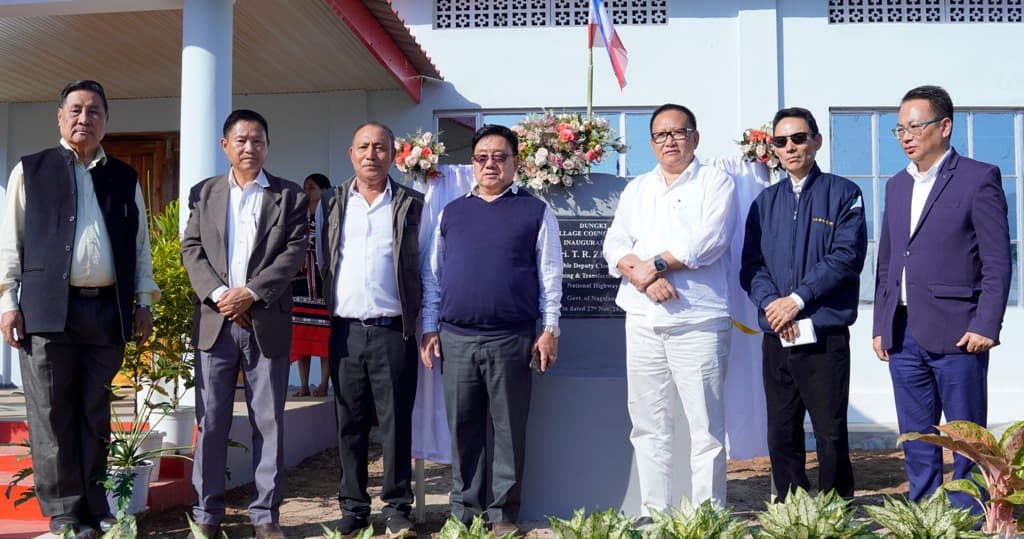FRIDAY, NOVEMBER 28, 2025
- Home
- TR Zeliang inaugurates centre for oil palm farmers in Peren
TR Zeliang inaugurates centre for oil palm farmers in Peren
Deputy Chief Minister TR Zeliang inaugurates Godrej Agrovet Ltd. ‘Samadhan’ at Jalukie in Peren district.
Share

DIMAPUR — Deputy Chief Minister TR Zeliang on Thursday inaugurated the Godrej Agrovet Ltd. ‘Samadhan’ One-Stop Solution Centre at Jalukie in Peren district, marking a significant step toward empowering the state’s oil palm farmers.
Speaking at the inaugural programme, the deputy chief minister said the centre represents “a new chapter of opportunity, empowerment, and prosperity” for farmers, particularly those engaged in oil palm cultivation, an update stated.
Zeliang highlighted that farmers have long struggled with limited access to quality seedlings, fertilisers, modern tools, and scientific guidance — gaps the new facility seeks to address.
The ‘Samadhan’ centre will provide farmers with high-quality oil palm seedlings, specialised fertilisers, crop protection products, drip irrigation systems, and farm equipment.
Also read: Campaign on settlement of unclaimed deposits in Dimapur on November 28
It will also offer services such as soil and leaf testing, technical advisory support, and harvesting assistance, which he termed “game-changing” in shifting farming towards more scientific and efficient practices.
Calling the initiative a successful example of Public–Private Partnership, Zeliang said it aligns with the State Government’s vision of revitalising agriculture and improving farmers’ incomes. He expressed appreciation to Godrej Agrovet for investing in the State’s farming community and for choosing Jalukie—located within his constituency—for the first such facility in Nagaland.
He noted Jalukie’s fertile land, favourable climate, and strategic connectivity through Dimapur’s commercial hub, railway head, and airport, as well as the upcoming NH-129A, positioning the area for growth as an agro-commercial centre.
The deputy CM also recalled the challenges faced during the implementation of the North East Rural Livelihood Project (NERLP) in Peren and Tuensang districts between 2012 and 2019, where lack of early awareness limited the community’s ability to fully benefit.
He urged Godrej Agrovet to avoid a repeat of such experiences by regularly sensitising farmers and addressing misconceptions about oil palm cultivation.
“With our natural advantages and the strong emphasis from the Union Government under Prime Minister Narendra Modi, our people have the potential to achieve self-sufficiency through oil palm farming,” he said, encouraging farmers to actively utilise the facility and adopt modern techniques for better productivity.
The inauguration was attended by Godrej Agrovet officials including Chava Venkateswara Rao, Associate Vice President; Muthuselvan, Manager; Advisor Mhathung Yanthan; Director of Agriculture Sanuzo Neinu; Dr. Benjongtoshi; agriculture department officials, farmers, and others.
Naga customary law needs revamp
Deputy Chief Minister TR Zeliang on Thursday said that a renewed framework for the recognition, protection and practical application of Naga customary law within contemporary governance structures is the need of the hour.
The deputy CM said that the government of the day is committed to upholding the unique cultural heritage, social institutions and traditional dispute-resolution mechanisms of the Naga people.
Speaking at the inaugural function of Dungki Village Council hall, Zeliang asserted that Naga customary law remains a living system, deeply rooted in community values, identity and time tested practices.
He also said that Naga customary law is not merely a cultural artefact, but active pillar of Naga society.
He suggested that the traditional norms are respected legally, safeguarded and harmonised with modern governance for the benefits of every citizen.
“Our goal is not to alter customary laws but to strengthen its rightful place within the modern administrative framework,” he said, adding that a working group should also be form to address areas where customary law and statutory law intersect to ensure clarity, fairness, and community participation in decision.

